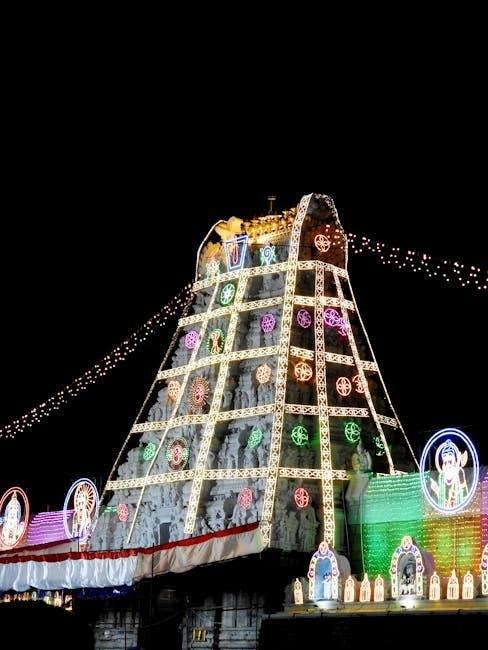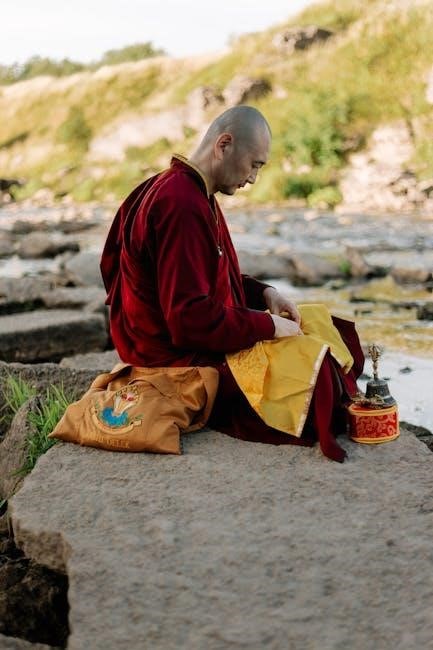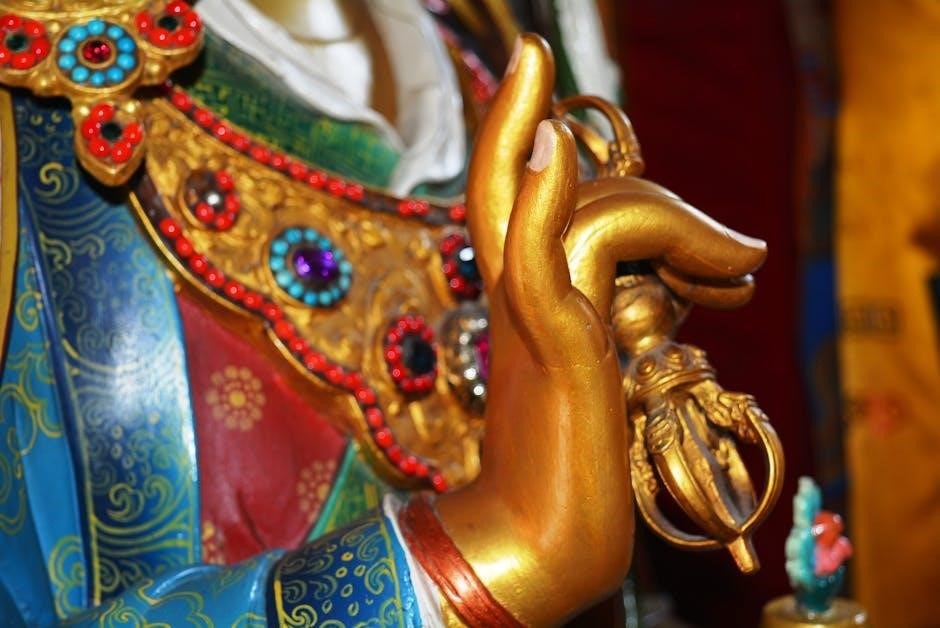Venkateswara Vajra Kavacham is a sacred stotram dedicated to Lord Venkateswara, offering divine protection and spiritual strength. It is attributed to Sage Markandeya and is known as the “Diamond Armour,” symbolizing its impenetrable protective powers. This hymn is widely revered in South India, particularly among Telugu-speaking devotees, and is often recited for its profound spiritual and protective benefits.
1.1 Overview of the Stotram
Venkateswara Vajra Kavacham is a powerful devotional hymn dedicated to Lord Venkateswara, composed by Sage Markandeya. It is part of the Markandeya Purana and consists of 75 verses, each imbued with spiritual significance. The stotram is often referred to as the “Diamond Armour” due to its protective qualities and is widely recited by devotees seeking blessings and safeguarding against adversities. Its popularity in Telugu-speaking regions has led to its availability in PDF format for easy access and recitation.
1.2 Significance of the Vajra Kavacham
The Vajra Kavacham is a sacred hymn embodying divine protection and blessings from Lord Venkateswara. It is revered for its ability to ward off adversities and bestow spiritual strength. Reciting this stotram is believed to offer solace, prosperity, and protection, making it a vital part of devotional practices. Its significance is deeply rooted in Hindu spirituality, particularly among Telugu-speaking devotees, who cherish it as a powerful prayer for daily life.
Composition and Significance
Composed by Sage Markandeya, Venkateswara Vajra Kavacham is a powerful stotram from the Markandeya Purana, revered for its divine protection and spiritual significance in Hindu devotion.
2.1 Attributed Composer: Sage Markandeya
Sage Markandeya, a revered sage in Hindu mythology, is credited with composing the Venkateswara Vajra Kavacham. This composition underscores his deep devotion to Lord Venkateswara, reflecting his spiritual wisdom and connection to the divine. Markandeya’s authorship lends significant authenticity and sacredness to the stotram, making it a cherished hymn in Vedic literature and worship practices.
2.2 Mention in Markandeya Purana
The Venkateswara Vajra Kavacham is prominently mentioned in the Markandeya Purana, a revered Hindu scripture. This sacred text highlights the stotram’s divine origin and its role in offering protection and blessings to devotees. The mention in the Purana underscores its spiritual significance and reinforces its connection to Lord Venkateswara, making it a deeply cherished hymn in devotional practices.
2.3 Meaning of “Vajra Kavacham”
“Vajra Kavacham” translates to “Diamond Armour,” symbolizing an impenetrable protective shield. It embodies Lord Venkateswara’s divine grace and strength, offering devotees invulnerability against adversities. The term “Vajra” signifies indestructibility, while “Kavacham” represents armour, together signifying a powerful mantra for spiritual safeguarding and eternal peace, deeply rooted in devotion and faith.

Benefits of Reciting Venkateswara Vajra Kavacham
Reciting Venkateswara Vajra Kavacham offers spiritual growth, mental peace, and emotional stability. It provides protection from obstacles, enhances devotion, and grants divine blessings for a harmonious life. Regular recitation is believed to strengthen faith and bring prosperity, making it a powerful practice for devotees seeking inner calm and worldly success.
3.1 Spiritual Benefits
Reciting Venkateswara Vajra Kavacham enhances spiritual growth by fostering a deep connection with Lord Venkateswara. It purifies the mind, strengthens devotion, and helps achieve inner peace. The stotram is believed to grant spiritual enlightenment, protect against negative energies, and facilitate a closer bond with the divine, leading to liberation and eternal bliss. Regular recitation elevates one’s consciousness and spiritual awareness significantly.
3.2 Mental and Emotional Benefits
Reciting Venkateswara Vajra Kavacham provides mental clarity and emotional stability. It helps alleviate stress, anxiety, and fear, offering solace and peace of mind. The stotram instills confidence, calms the mind, and strengthens emotional resilience. Regular recitation fosters a positive mindset, enabling devotees to face life’s challenges with courage and equanimity, promoting overall mental and emotional well-being.
3.3 Protection and Obstacle Removal
Venkateswara Vajra Kavacham is revered for its protective powers, acting as a divine shield against negative forces and misfortunes. It is believed to remove obstacles, ward off evil influences, and grant safety in challenging situations. Regular recitation helps devotees overcome hindrances, ensuring smooth progress in life and offering a sense of security and divine protection.

Structure of the Stotram
Venkateswara Vajra Kavacham consists of sacred verses focused on divine protection and spiritual empowerment, with specific emphasis on Lord Venkateswara’s blessings and armor-like shield against adversities.
4.1 Number of Verses and Their Focus
Venkateswara Vajra Kavacham comprises 30 verses, each invoking divine protection and strength. The stotram focuses on Lord Venkateswara’s blessings, offering a spiritual shield against life’s challenges. Each verse emphasizes themes of divine armor, obstacle removal, and spiritual growth, providing devotees with a profound sense of security and connection to the divine.
4.2 Key Themes and Mantras
The stotram revolves around themes of divine protection, obstacle removal, and spiritual empowerment. Key mantras like “Om Namo Venkatesaya” and verses invoking Lord Venkateswara’s blessings are central. The hymn emphasizes the lord’s armor-like protection, reinforcing faith and resilience. Specific mantras highlight his divine attributes, offering devotees a sense of security and spiritual elevation through regular recitation.
Availability of Venkateswara Vajra Kavacham in Telugu PDF
The Venkateswara Vajra Kavacham in Telugu PDF is widely available for free download on various devotional websites, including teluguone.com, allowing devotees to access and recite it conveniently.
5.1 Sources for Free Download
Venkateswara Vajra Kavacham in Telugu PDF is available for free download on various devotional websites such as teluguone.com and other platforms. Devotees can easily access and download the PDF or read it online. The stotram is also available in text format, ensuring accessibility for all. These sources provide a reliable way to obtain the sacred text for personal worship and recitation.
5.2 Important Considerations for Downloading
When downloading Venkateswara Vajra Kavacham in Telugu PDF, ensure the source is trusted to avoid pirated or corrupted content. Verify the authenticity of the PDF and check for malware. Always respect intellectual property rights and cite sources appropriately. Be cautious of modified versions and ensure the text aligns with traditional scripts. Prioritize downloads from reputable devotional websites for a safe experience.
Meaning and Interpretation of the Stotram
Venkateswara Vajra Kavacham is a divine armor prayer, composed by Sage Markandeya, seeking Lord Venkateswara’s protection. It symbolizes spiritual strength and enlightenment, offering devotees refuge from adversities through its sacred verses.
6.1 Explanation of Key Verses
The stotram, composed by Sage Markandeya, consists of sacred verses that invoke Lord Venkateswara’s divine protection. Each verse symbolizes spiritual armor, offering refuge from life’s challenges. The hymn’s structure and meaning emphasize devotion, surrender, and the quest for liberation, making it a powerful tool for seekers of divine grace and protection.
6.2 Allegorical and Spiritual Interpretations
The stotram symbolizes spiritual protection and divine grace, with verses serving as metaphors for overcoming life’s challenges. It embodies the idea of surrender to Lord Venkateswara, seeking refuge in His divine armor. The hymn’s allegorical layers emphasize transcendence, self-realization, and the journey toward moksha, offering devotees a profound path to spiritual growth and inner peace through devotion and faith.

Guidelines for Recitation
Recitation is ideal during early morning or evening in a calm, pure environment. Devotees should bathe, wear clean clothes, and maintain focus to amplify spiritual benefits and connection.
7.1 Ideal Time and Place for Recitation
The ideal time for reciting Venkateswara Vajra Kavacham is during the early morning or evening, in a serene and sacred environment. Devotees should choose a clean, quiet space, preferably facing east or north, to enhance focus and spiritual connection. Ensuring personal purity and a calm mind is essential for effective recitation and maximum divine grace.
7.2 Rituals and Preparations
Before reciting Venkateswara Vajra Kavacham, one should perform a simple puja, light a lamp, and offer flowers or prasadam to Lord Venkateswara. Bathing and wearing clean clothes are essential. Sitting on a sacred seat like a Tulasi leaf or a wooden plank is recommended. Chanting with a focused mind and using a Tulasi mala for counting ensures purity and effectiveness of the recitation.
Role in Daily Worship and Practices
Venkateswara Vajra Kavacham is integral to daily worship, recited during puja for divine grace. It strengthens devotion, fostering peace and protection, and is cherished in both home and temple practices.
8.1 Incorporating the Stotram into Daily Puja
Devotees incorporate Venkateswara Vajra Kavacham into daily puja by reciting it during morning and evening worship. The Telugu PDF version makes it accessible for devotees to chant effortlessly, seeking divine protection and blessings. Recitation during puja fosters spiritual growth, mental clarity, and a deep connection with Lord Venkateswara, enhancing the efficacy of daily rituals and fostering a peaceful ambiance for worship.
8.2 Its Place in Temple and Home Worship
Venkateswara Vajra Kavacham holds a revered place in both temple and home worship, often recited during rituals and festivals. Temples incorporate it into daily prayers, while devotees chant it at home for protection and blessings. The Telugu PDF version facilitates easy recitation, making it a integral part of worship, enhancing spiritual practices, and fostering a sacred atmosphere for connecting with Lord Venkateswara.

Cultural and Religious Significance
Venkateswara Vajra Kavacham holds immense cultural and religious significance, being a revered hymn in South Indian spirituality. It is chanted during festivals and rituals, symbolizing divine protection and faith in Lord Venkateswara.
9.1 Role in Tirumala Venkateswara Devasthanams
Venkateswara Vajra Kavacham holds a revered place in Tirumala Venkateswara Devasthanams, where it is often recited during sacred rituals and festivals. Devotees believe its recitation invokes divine protection and blessings. The availability of the Telugu PDF version has made it accessible for devotees to recite during temple worship and home pujas, strengthening its cultural and religious significance in the shrine’s traditions.
9.2 Celebration in Festivals and Events
Venkateswara Vajra Kavacham is integral to festivals like Brahmotsavam and other sacred events. Devotees recite it to seek divine blessings and protection, enhancing its cultural significance. The Telugu PDF version’s accessibility allows widespread participation, making it a cherished part of community celebrations and personal worship during auspicious occasions.

Leave a Reply